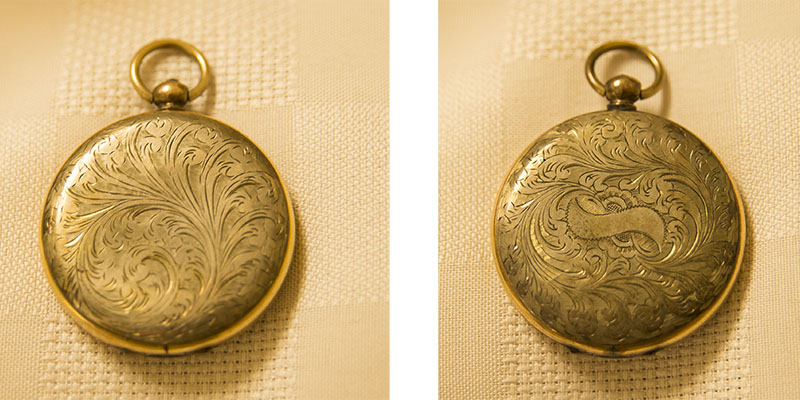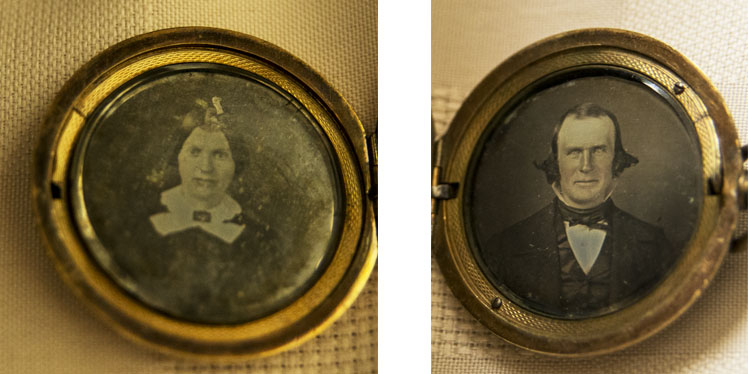Exterior of Glover keepsake locket [1984.34.248]
An engraved locket in our collection contains daguerreotypes of Mary Baker Eddy’s brother-in-law and sister-in-law, Andrew Jackson Glover (1817-1880) and Bethiah Torrens Glover (1826-1883). Andrew was the youngest brother of Eddy’s first husband, George Washington Glover.
Daguerreotype lockets became popular at the onset of the Civil War. Soldiers carried “keepsake lockets” they had been given by mothers, wives, or fiancées. The locket contained a picture and sometimes a lock of the loved one’s hair. The locket in our collection is about the size of a pocket watch. It was possibly a keepsake for Andrew Jackson Glover himself, designed to be carried on a watch chain. The Glover locket is silver-gilt and has an engraved scrolling foliate design; the scroll plaque for personalized engraving remains unfinished. The daguerreotype miniatures date from about 1860 and have been fused to glass, then secured behind plate glass.
Andrew Jackson Glover and Bethiah Torrens Glover, circa 1860. P00862A & P00862B.
Courtesy of The Mary Baker Eddy Library.
Andrew Jackson Glover was born in Bow, New Hampshire, and married Bethiah Curtis Torrens of Lisbon, Maine, on December 7, 1843.1 They had seven children: Sullivan, Georgiannah, Leonard, Andrew, Mary, Freddy, and Bertha.
As a young man Andrew followed the path of two older brothers (George and Sullivan), working as a bricklayer until 1846, when his father, John, deeded to him the Glover family homestead and farm in Concord.2 As part of the agreement, Andrew had to maintain and support his parents, as well as his eldest brother, John.
Mary Baker Eddy’s son, George Washington Glover II, was also to receive $100 from his uncle Andrew at the time of his grandfather John’s passing.3 Six-year-old George visited this bustling household in the spring of 1851, while Eddy was living with her sister, Abigail Baker Tilton. At this time Andrew and Bethiah had one son, Sullivan, so George made an ideal—if rather lively—playmate. Eddy (Mary Glover at the time) wrote to Andrew and Bethiah on April 21, 1851:
Wont you send me a line by him or come yourselves? I want very much to know how you have succeeded with him and if he has been a good boy (some naughty things of course) There is no child whom we expect mature in any respect, but take Georgy with the aggregate, is he not a pretty good and very dear boy?…. Will dear little Sully be sorry to have him leave?….4
This was likely only a few weeks before George went to live with Russell and Mahala Cheney. Russell Cheney would eventually become George’s legal guardian.
In 1851 Andrew paid $40 for a family pew in the First Free Will Baptist Society meeting house, at the corner of Green and Center Streets in Concord.5 Following the death of his father in 1853, he began selling off pieces of the family farm until 1864, when he purchased a farm in Allenstown, New Hampshire. After this Andrew Glover was a farmer and a “buckmake”—a buckboard carriage maker—until his passing in August 1880.
- Glover Family Bible, B00025.
- Deed of Sale from John Glover to Andrew Jackson Glover, 23 October 1846, book 86, page 233, Merrimack County Registry of Deeds, Merrimack County, New Hampshire.
- Deed of Sale from Andrew Jackson Glover to John Glover, 23 October 1846, book 86, page 234, Merrimack County Registry of Deeds, Merrimack County, New Hampshire.
- Mary B. Glover to Andrew & Bethiah Glover, 21 April 1851, F00030.
- Deed of Sale from First Free Will Baptist Society to Andrew Jackson Glover et al., 23 June 1851, book 104, page 432, Merrimack County Registry of Deeds, Merrimack County, New Hampshire.



